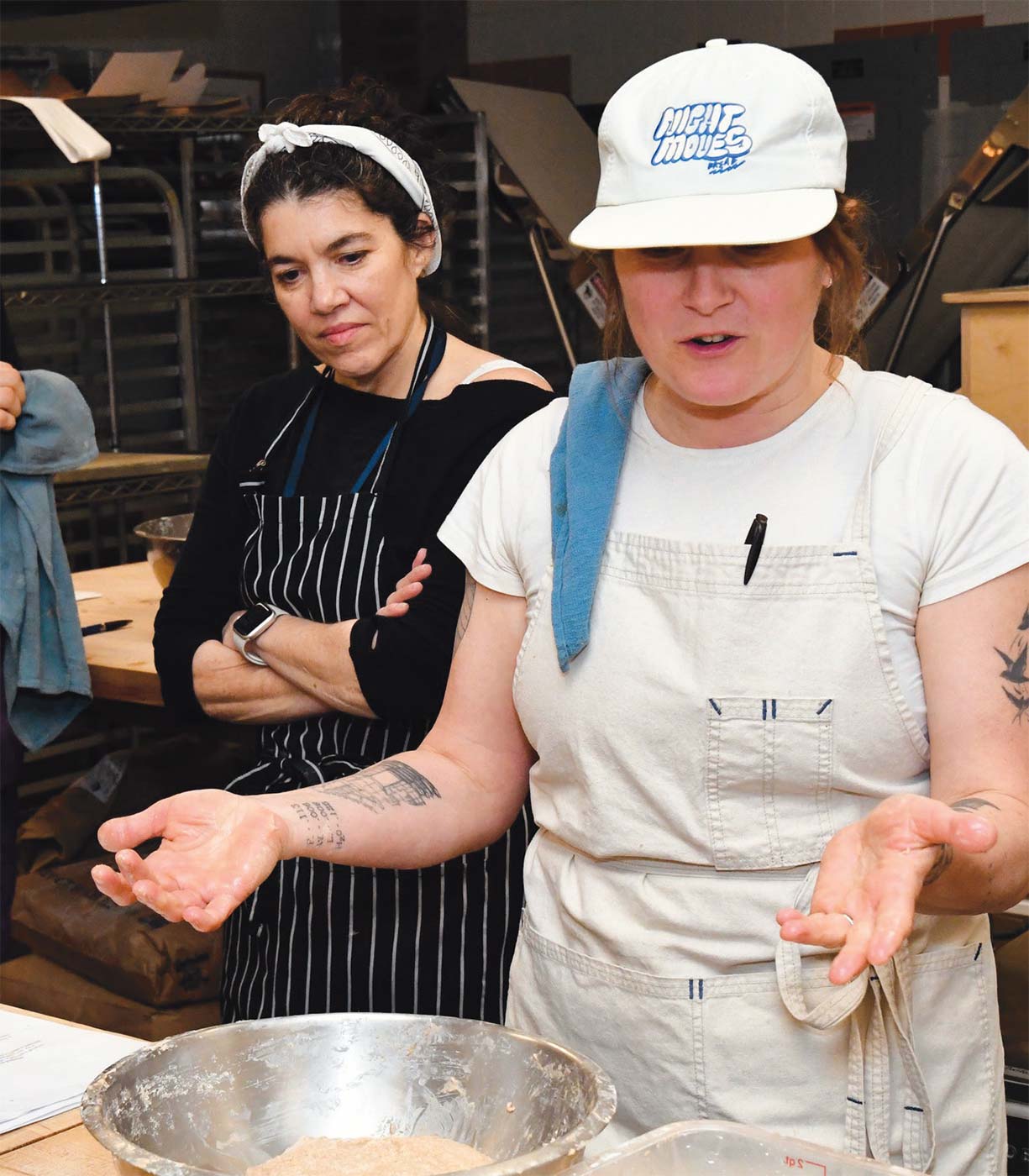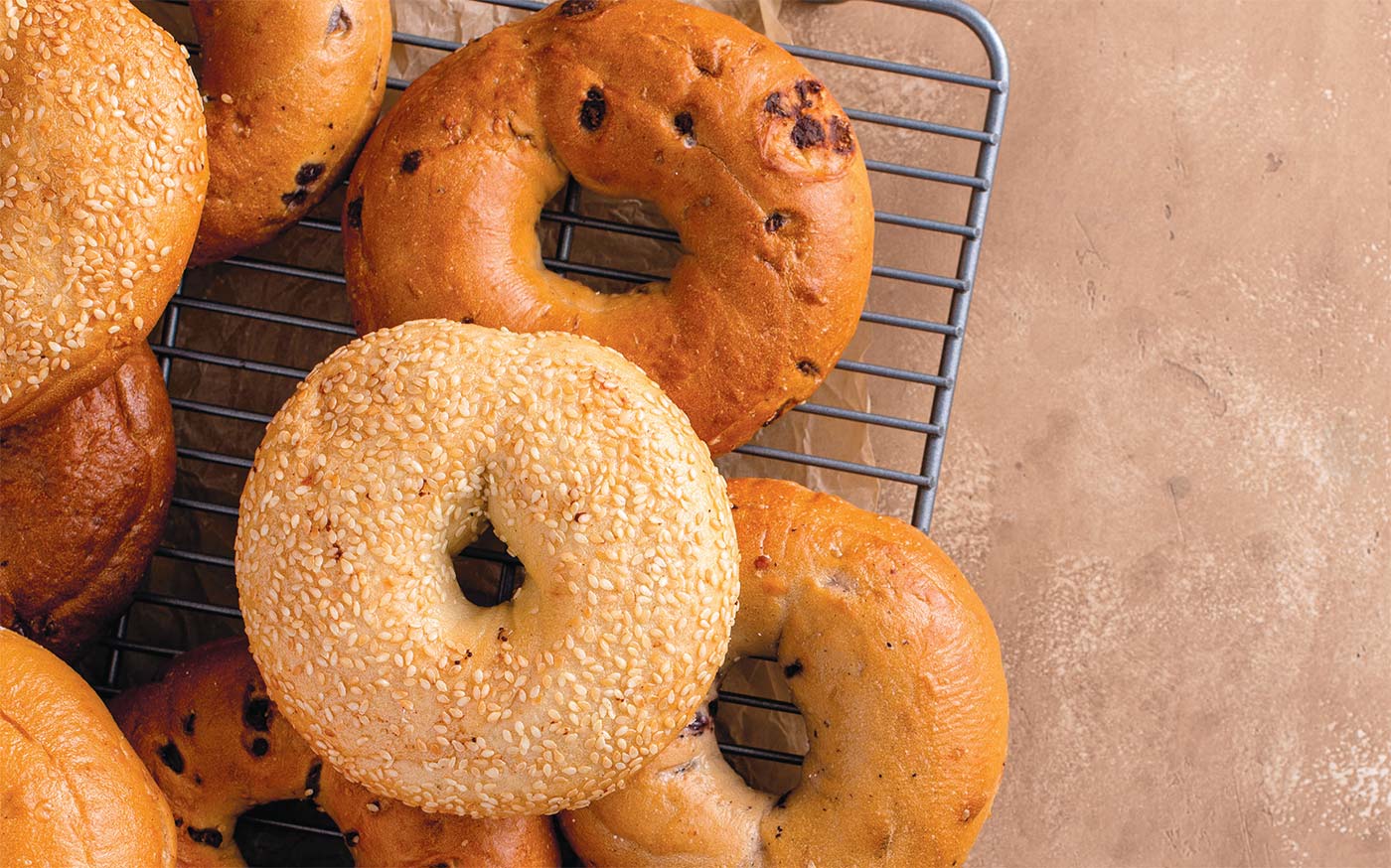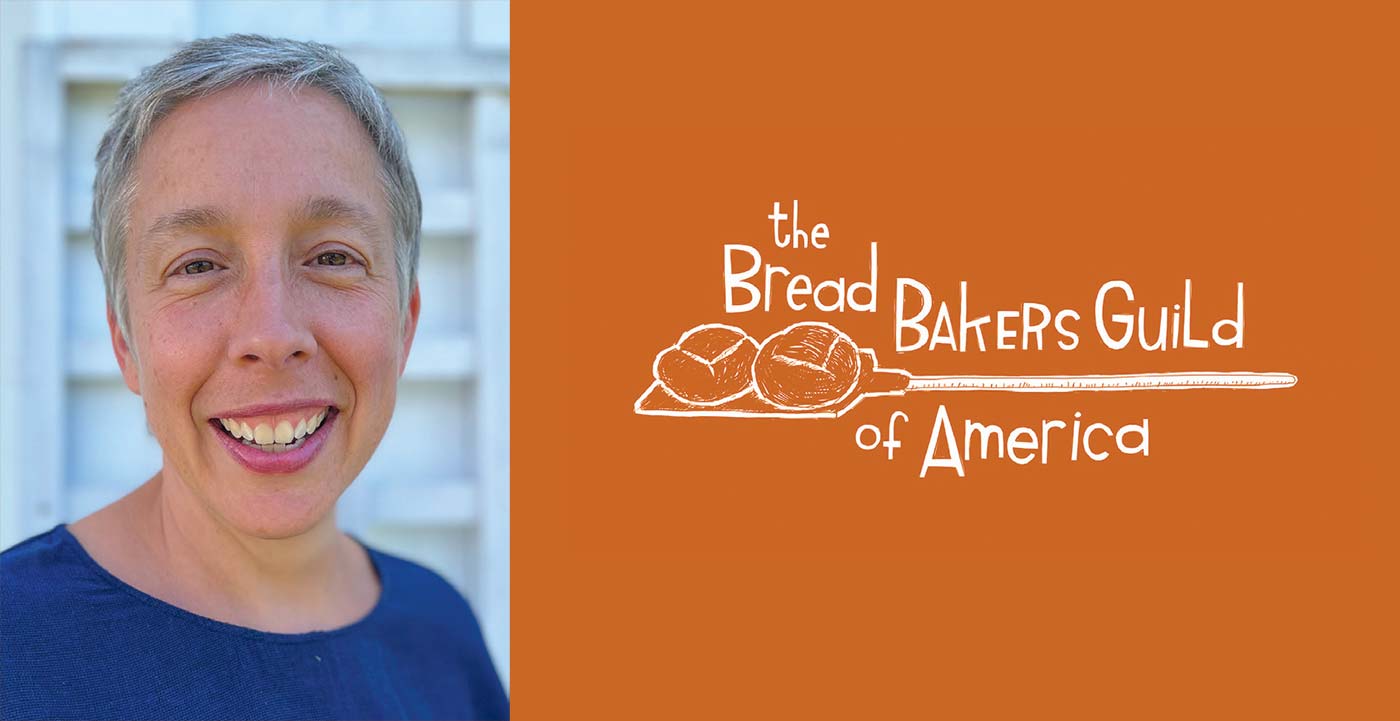Karen Bornarth: Executive Director of The Bread Bakers Guild of America
Seeking a national perspective on artisan baking and the local grain revolution, I reached out to Karen Bornarth, executive director of The Bread Bakers Guild of America (BBGA). Karen spent the first 20 years of her career in production baking, teaching and training, workforce development, and helping women, immigrants, and people of color thrive in the culinary industry. She continues this vital work on a national level overseeing the BBGA. Karen and her son happily transitioned from Brooklyn to the Catskills region of New York.
Give us a thumbnail of The Bread Bakers Guild of America (BBGA).
Karen Bornarth: We are a nonprofit membership association of artisan bakers, bakery owners, and anyone committed to our craft and also committed to the health of our small businesses, our communities, and our workers. We have around 2,000 members right now from around the world, including more than 50 businesses and bakers in Vermont. We support our members with education, baking techniques, and the business of baking.
Oftentimes, people have a real love of making something but don’t necessarily have the same love or talent for running a business. They know how to make a great croissant or loaf of artisan bread but struggle to manage their team or to keep their books, or whatever it is. We’re really trying to knit those two sides together so they can be successful in their baking careers, their businesses, or simply in their craft.
And it could be bread, it could be beautiful pastries.
KB: It could be anything. The Guild was founded in 1993 with a particular focus on European artisan breads at a time in this country when that style of baking was fairly uncommon. There was very little education or information on how to do these long fermented, completely “clean label” breads. So this group of people who discovered they were trying to do the same thing came together, with a focus on bread, education, and baking techniques. But 30 years later, there’s so much more information about that kind of baking and many more people doing it.
So two things. Number one, I love that expression, “clean label” baking. It’s so elegant.
KB: I mean, that says it all. Right?
And second, tell me about some of your educational opportunities.
KB: We launched a five-part series this year called Building Blocks, available in English and Spanish, virtual classes on baking fundamentals with a particular focus on bread. We do hands-on classes and other events where membership entitles you to a discount. We also run an email forum in which members trade information about baking techniques. So you could type in a question there, and somebody such as Jeffrey Hamelman (founder of King Arthur Baking Company and Education Center and internationally admired Certified Master Baker) might respond. We have some very experienced bakers ready to offer advice. We also have this amazing formula database. For example, if you wanted to add brioche to your baking lineup, you can go into that database and find something that’s been tested if you don’t want to develop it yourself. These are some vital ways we knit people together.
Do you have a central hub?
KB: We’re a fully remote organization. We collaborate with King Arthur, so we’ll do classes in their baking centers in Vermont and at The Bread Lab in Washington State. We also work with Central Milling’s Artisan Baking Center in Petaluma, California. We have different hosts around the country where we can pop up these hands-on classes.
It’s so nimble.
KB: Actually, not having a facility gives us a lot of flexibility. Because we’re a national organization, concentrating all our activity in one place would not serve the majority of our members. We organize gatherings in different locations. Camp Bread, our flagship event, is three days of hands-on baking education, classes on the business of baking, and a lot of opportunities to just network and connect. That took place in Providence, Rhode Island at Johnson & Wales. Camp Bread will happen again in 2027, so mark your calendar. It’s a pretty awesome event.

Blair Marvin of Elmore Mountain Bread teaching at Camp Bread in Providence, Rhode Island. PHOTO: ABE FABER
“Vermont was one of the first states to think about reviving local grain economies. You have a small state of well-connected, community-minded people who have done a good job of working out questions around distribution, which is so critical.” –Karen Bornarth
I heard about the bread tour the Guild sponsored in northern Vermont earlier in the summer.
KB: Yes. That tour was a part of a new series that we launched called Seed to Slice. Seed to Slice is an opportunity for bakers or anyone who’s interested in local grain to connect with the whole grain chain in their area. You’re visiting the farm, the mill, and the bakeries that are using the grain. And of course, you get to taste the products! We were in Vermont, Illinois, and Arizona in 2024. This year, we’re going to be in Minnesota, Virginia, and Oregon, as well as doing some virtual programming with a panel of farmers and bakers. This is an incredible opportunity for us to come together and actually talk about what’s important to each of us and what the challenges are. Climate change is taking a real toll on farms all around the country. We want to bring these groups together and get the farmers and bakers talking and learning from each other to benefit everyone in the end.
What was your own path to baking?
KB: My mother didn’t bake, but my grandmother did. I didn’t stand side by side and bake with her in the kitchen, but I was fascinated with the idea of homemade bread because I didn’t have it. I didn’t even have bakery bread. I graduated from college with an English major and ultimately ended up in academic publishing, which was interesting and fulfilling, but I wanted to do something more physical where I could see the result of my day’s work. So in 1999, I did a baking and pastry program at the Culinary Institute of America in California and fell in love with bread. What’s particularly interesting about bread is that it really is different every day. Even though you’re working with four ingredients or possibly three, these incredible variations happen because you’re working with a living thing. Bread baking was never boring to me, even though it was essentially doing the same thing every single day.
Talk about the increased interest in local grains and freshly milled flour.
KB: I think there’s been an explosion of knowledge in all parts of the process. We’ve seen an evolution in using different types of grains, certainly using more whole grain in our baking, incorporating more small grains such as rye and spelt. It’s incredible how much good bread there is in this country now. I grew up on supermarket bread, this sliced stuff in a packaged bag. And now my son, I’m so envious of the bread he gets to enjoy in his childhood.
Overall, where does Vermont fall in the national scene in terms of the grain and bread revolution?
KB: I think Vermont, as it often is, is a leader in this kind of thing. Vermont was one of the first states to think about reviving local grain economies. You have a small state of well-connected, community-minded people who have done a good job of working out questions around distribution, which is so critical. Vermont’s really been a leader, just as Vermont has been a leader in this style of artisan craft baking. Hats off to Chuck Conway at O Bread Bakery in Shelburne who’s been around for 50 years. And Randy George at Red Hen Bakery for 25 years.
And then we have the iconic King Arthur here in Norwich.
KB: You can’t understate the importance of King Arthur and their national reach. The education they’ve provided to professional bakers and home bakers is remarkable. Much of my own education came from King Arthur as well, primarily through Jeffrey Hamelman. Not just on baking, but an overall business mindset because King Arthur is such a model—an employee-owned B Corp—that stands by its beliefs.

“Two areas of bread baking that are blowing up with artisan energy: bagels and pizza. Bagel makers are thinking about their flour and their processes. But there’s also this fun culinary element of all the great stuff you can put on top of a bagel. Pizza makers are really focusing on their dough.” –Karen Bornarth
How about trends you’re seeing across the country?
KB: Two areas of bread baking that are blowing up with artisan energy: bagels and pizza. Bagel makers are thinking about their flour and their processes. But there’s also this fun culinary element of all the great stuff you can put on top of a bagel. Pizza makers are really focusing on their dough. One of our Vermont BBGA members is Woodbelly Pizza in Woodbury. Jonah uses flour from Elmore Mountain Bread and local produce, and is very thoughtful not just about the toppings but also about the dough itself. And there’s also so much excitement around laminated products, which probably traces back to the Cronut.
Mentors or teachers whom you respect?
KB: Jeffrey Hamelman as not only a teacher of bread but as a generous human being. He embodies the soul of the teacher. I also admire the writer Amy Halloran from Troy, New York. I love that Amy takes a holistic look at baking, not just in bread but also bakeries. She explores the product as well as the people and the processes.
Anything else on your mind?
KB: I’m just excited for all these small business owners who are so thoughtful about what they’re doing, in terms of its impact on their communities, on their workers, and on the environment. It’s such an inspiring, energized period. I think there’s a sea change out there in the local grain movement that can have incredibly positive ramifications across the baking industry, truly.





